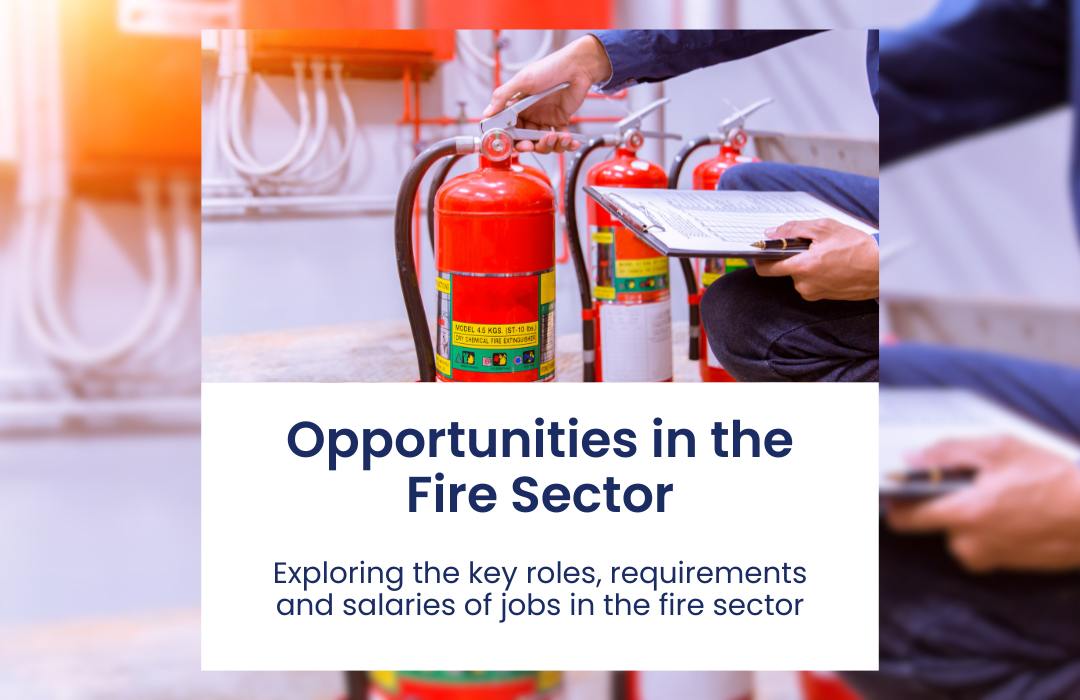Opportunities in the Fire Sector
08 May, 20245 MinutesCareer opportunities within the fire sector The fire sector offers many career opportun...

Career opportunities within the fire sector
The fire sector offers many career opportunities, from fire safety jobs to trade-specific positions like carpentry, with each role requiring various qualifications and expertise. If you’re considering a career in the fire sector, you might be wondering what jobs are available, what qualifications you need, the average salary of fire sector workers, and more. This article will delve deep into these questions and bring you one step closer to a job in the fire sector.
Key roles within the fire sector
Many fire sector job roles are critical in ensuring public safety across various public, private, and commercial spaces. These roles are imperative to ensure proper compliance and mitigate the risk of fire-related incidents.
Fire Stoppers:
Fire Stoppers specialises in installing and maintaining fire-stopping systems, including resistant barriers and measures to prevent fire from spreading within buildings.
Fire Door Carpenters:
Also known as FRA Carpenters, they have the role of crafting, installing and maintaining fire-resistant doors and frames, essential components in fire risk mitigation and fire safety.
Fire Door Joiners:
Working closely with carpenters, fire door joiners specialise in assembling fire doors and barriers, which are supplied to carpenters for fitment.
Fire Door Inspectors:
They play a pivotal role in ensuring fire door systems are of good quality and ensure full compliance through a thorough inspection.
AOV Installers:
Tasked with installing automatic opening ventilation systems, crucial for smoke control and safe evacuation during an emergency.
Fire Alarm Testers:
Responsible for testing and maintaining fire alarm systems, ensuring their readiness to alarm if necessary.
Compliance Officers:
Oversee the compliance of all fire safety functions, from fire safety regulation adherence to security systems to installing advanced technologies to safeguard both lives and property.
These roles all form a network dedicated to mitigating risk and enhancing safety. At Daniel Owen, we work with clients across social housing, property services, and facilities management to supply fire safety candidates.
So, what qualifications and requirements do you need in the fire sector?
The qualifications and requirements vary from role to role. Generally, a combination of formal education, training, and relevant certification is necessary. Here are some of the most common qualifications:
NEBOSH (National Certificate in Fire Safety and Risk Management):
This qualification is designed for individuals with fire safety responsibilities in the workplace, from facilities managers to fire compliance officers; a NEBOSH certificate is a leading certificate giving you an advantage in the sector.
IOSH (Institute of Occupational Safety and Health):
IOSH offers training courses to managers, team leaders, and all staff. The courses are all based around preventing fires in the workplace and are advantageous to have on your CV.
Trade-specific training:
Specific roles may require trade certifications or apprenticeships, such as carpentry or electrical work. These could be college courses, training provider courses, or apprenticeships.
Experience:
While some entry-level positions may not require prior experience, higher-level roles often require extensive experience in the relevant field.
What are the average salaries in the fire safety sector?
The current average salary within the fire safety sector is £32,500. However, this figure is to be taken lightly. Salaries heavily depend on experience, location, and specific jobs.
For example, an entry-level role as a fire safety manager can pay £26,000, whereas a more experienced Fire Safety Manager can be paid upward of £70,000.
We recommend searching job boards and our fire sector page to learn more about role specific salary ranges.
Breaking into the fire sector
Breaking into the fire sector requires a combination of education, training, and experience. Here are some steps to consider:
Education and training:
As mentioned, you could pursue relevant education through training programmes, trade apprenticeships and college courses.
Gain experience:
Seek to gain hands on experience through work experience opportunities, entry level positions and apprenticeships, this will enhance your CV and boost your relevance in the sector.
Obtain certifications:
NEBOSH and IOSH are a great place to start, there are many qualifications out there related to specific roles within the fire sector. These certifications will enhance your credibility and experience.
Networking:
Attend fire sector related events, networking with other industry professionals and joining relevant associations to expand your connections.
The fire sector offers diverse career opportunities for individuals interested in a multitude of career paths, from carpentry or electrics to fire stopping and compliance specialists, the fire sector offers something for everyone.
Interested in a job within the fire sector?
View our jobs here
Need a helping hand filling your projects with compliant, high quality fire sector workers?
Get in touch.



